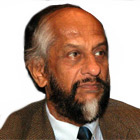 One sometimes wonders how the scientists most reviled by the denial industry are bearing up under the onslaught. Michael Mann is one of them, so I was interested to listen to him being interviewed by Chris Mooney on a recent Point of Inquiry podcast. Here is a summary of some of Mann’s responses (not an accurate transcript, though mostly in his words):
One sometimes wonders how the scientists most reviled by the denial industry are bearing up under the onslaught. Michael Mann is one of them, so I was interested to listen to him being interviewed by Chris Mooney on a recent Point of Inquiry podcast. Here is a summary of some of Mann’s responses (not an accurate transcript, though mostly in his words):
On the science:
The bottom line is the basic physics and chemistry of the greenhouse effect. Observation that the globe is warming and that the warming is unusual in the long term context fits what the basic physics and chemistry says. After decades of work by thousands of scientists round the world pursuing every lead – thinking of all the possible different explanations of the phenomena they observe – there is literally no evidence that calls into question the basic radiative properties of greenhouse gases. You increase greenhouse gas concentrations, you will warm the atmosphere. Questioning that basic reality is almost like questioning the spherical nature of the Earth.
What scientists actually spend time debating and pursuing are issues like feedbacks – the processes that might amplify or diminish that warming. There are open questions relating to such matters as clouds, El Ninos, hurricanes, and so on, which are being actively pursued. But on the basic issue – the scientific community moved on from that question decades ago.
On the strategy of attacks on the science:
The critiques almost never actually discredit a line of evidence or a basic conclusion. They take some small technical part of an analysis, try to manufacture a controversy about that to essentially discredit the work by finding some small potential flaw with one part of an analysis.
On the hockey stick:
There are more than a dozen reconstructions; every one of them comes to the same conclusion as our decade-old work that the recent warming is anomalous in at least 1000 years. Our attackers never want to look at the big picture, never want to look at whether they have any impact on the bottom-line conclusions, because they know that they don’t.
Even if they had been successful in taking down the hockey stick, which they haven’t been, it still wouldn’t amount to undermining the central case for the science.
On concealing data:
All of our data was available in the public domain and any claim to the contrary was dishonest. The question of making codes public is different and is not considered required as general practice. However I and my collaborators have made a decision to put every scrap of code as well as every scrap of data in public domain at the time we publish a paper. We’ve gone beyond what the standards of the community are.
On Phil Jones request to delete emails:
It was an email he wrote in the heat of the moment. He was under attack. Keep in mind this guy received something like 40 freedom of information demands over a weekend. He was being harassed intentionally and the freedom of information demands that were being made were for materials that CRU legally could not even distribute. These were frivolous demands. Under that sort of harassment people sometimes say foolish things – we certainly didn’t delete any emails and I don’t think he did himself
On the “trick”:
This is a good example of how those working to make mischief can take a term that they probably fully know is perfectly innocent in scientific lingo, but exploiting the fact that it sounds very different to a non-technical person. It shows the disingenuousness of those leading the attack. They intentionally misrepresent words and phrases cherry-picked from thousands of emails in a cynical attempt to distort the scientists’ views and cast aspersions on a scientific discipline.
On fighting back:
The idea that scientists under siege should unilaterally disarm, give in to the sometimes criminal attacks of the anti-science forces looking to discredit them and their science, not stick up for their science and their colleagues, not fight back against these criminal efforts to misrepresent them and to impugn their integrity – it would be terribly misplaced if scientists were not to do all they can to fight back
On the difficulties:
Our detractors are extremely well funded, extremely well organised, they have had an attack infrastructure for decades. They developed it during the tobacco wars, they honed it further in other efforts to attack science that industry or other special interests find inconvenient. So they have a very well honed, well funded, organised machine that they are bringing to bear in their attack now against climate science. It’s like a marine in a battle with a cub scout when it comes to the scientists defending themselves. We don’t have the resources, the experience: we haven’t been trained, we’re not public relations experts, lawyers, lobbyists, we’re scientists. It’s a classic example of asymmetric warfare.
Many of us didn’t believe it would come to this – the scientific case for the reality of human-caused climate change has been clear now for several years, though there is much we have still to learn. Many of us thought, perhaps somewhat naively that in the end science would carry the day, that the strength of the scientific consensus would be enough. I wasn’t so sure. But what we all underestimated was the degree, the depth of dishonesty, the dirtiness, and cynicism to which the climate change denial movement would be willing to stoop to advance their agenda.
*****************
A stout defence from Michael Mann. What he wasn’t asked and doesn’t say is how high the stakes are. But anyone who has taken the trouble to understand the basic science knows they are very high indeed. The attack on climate science is an attack on all humanity. Not one for which the perpetrators are likely to be called to account, and perhaps it won’t really matter that they’re not. What matters more is that they call off the campaign, though one suspects that even if they wanted to, the forces they have loosed have so committed themselves that they will not heed any call to come to heel. Meanwhile those of us who are not climate scientists but can see the danger we are in must offer strong support to the science and opposition to the insidious campaign of denial.
Like this:
Like Loading...

 A headline caught my attention yesterday:
A headline caught my attention yesterday: “We have a very apt saying in Hindi, which essentially translates as: ‘When a jackal is threatened, he starts moving toward the city.’ In other words, he becomes more visible. I think some of these guys are speaking out volubly because they read the writing on the wall.”
“We have a very apt saying in Hindi, which essentially translates as: ‘When a jackal is threatened, he starts moving toward the city.’ In other words, he becomes more visible. I think some of these guys are speaking out volubly because they read the writing on the wall.”  One sometimes wonders how the scientists most reviled by the denial industry are bearing up under the onslaught.
One sometimes wonders how the scientists most reviled by the denial industry are bearing up under the onslaught.